Your diet directly influences your gut microbiome, which connects to your brain through the gut–brain axis. Eating fermented foods like yogurt and kimchi, along with fiber-rich fruits and vegetables, promotes beneficial bacteria that produce mood-enhancing chemicals like serotonin and GABA. Limiting processed foods and sugars helps maintain a healthy gut balance, supporting better mood and mental clarity. Keep exploring how specific foods and habits can boost your gut–brain health for a happier mindset.
Key Takeaways
- Diet influences the composition of gut microbiota, which affects neurotransmitter production linked to mood regulation.
- Consuming fermented foods and high-fiber diets promotes beneficial gut bacteria that support mental well-being.
- An imbalanced diet high in processed foods and sugars can reduce microbiome diversity, negatively impacting mood.
- Gut bacteria produce mood-related chemicals like serotonin, GABA, and dopamine, influencing emotional stability.
- Lifestyle choices like hydration, stress management, and sleep enhance gut–brain communication and mental health.
Understanding the Gut–Brain Connection
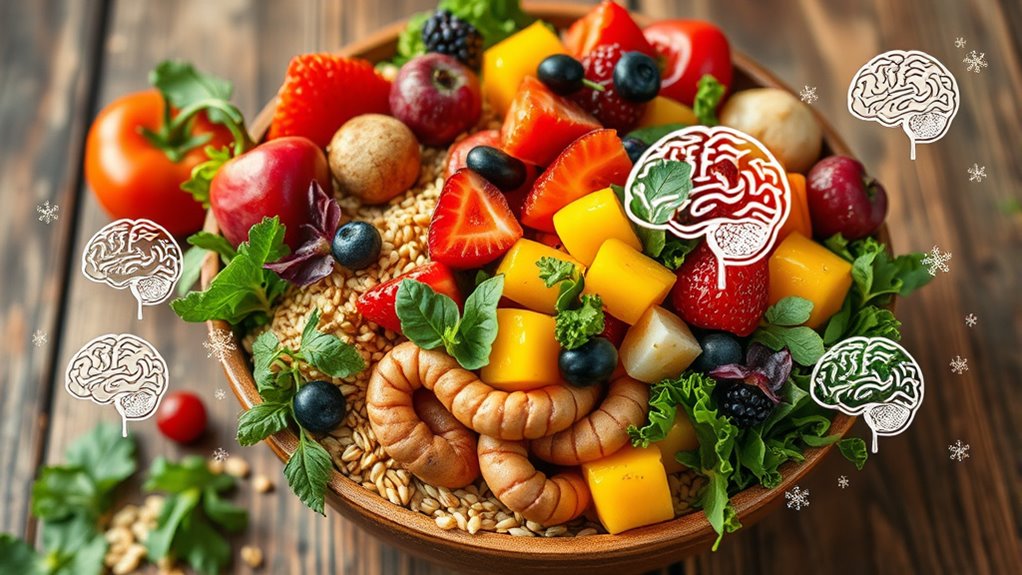
The gut–brain connection is a complex communication network that links your digestive system and your central nervous system. It involves bidirectional signaling, meaning your brain influences your gut, and your gut can send signals back to your brain. This connection is facilitated through nerves, especially the vagus nerve, along with hormones and immune system components. When your gut functions properly, it can impact your mood, stress levels, and overall mental clarity. Conversely, issues in your digestive system may lead to feelings of anxiety or depression. Understanding this connection helps you realize how closely your mental health and gut health are intertwined. Recognizing the importance of this link encourages you to pay attention to your diet and lifestyle choices to support both your brain and digestive health. Using professional equipment and continuous training can enhance your ability to understand and improve this vital communication pathway.
The Role of Gut Microbiota in Mental Health

Your gut microbiota influences your mental health by producing neurotransmitters like serotonin and dopamine that affect mood. When the balance of gut flora shifts, it can disrupt these chemical signals and contribute to emotional instability. Understanding these mechanisms highlights how maintaining a healthy microbiota supports better mood regulation. Additionally, research suggests that electric bikes and other eco-friendly transportation options can reduce stress and improve overall well-being.
Microbiota and Neurotransmitters
How do tiny gut microbes influence your mental well-being? They produce and modulate neurotransmitters—your brain’s chemical messengers. These microbes synthesize serotonin, dopamine, and GABA, directly affecting your mood, anxiety, and stress levels. Imagine this process as a control panel:
| Microbe | Neurotransmitter | Effect on Mood |
|---|---|---|
| *Lactobacillus* | GABA | Calms anxiety |
| *Bifidobacterium* | Serotonin | Boosts happiness |
| *Escherichia coli* | Dopamine | Enhances motivation |
| *Clostridium* | Tryptophan precursor | Regulates mood stability |
| *Saccharomyces* | GABA | Promotes relaxation |
These microbes act as tiny pharmacists, influencing your brain chemistry and, ultimately, your mental health. Additionally, the gut-brain axis facilitates communication between your digestive system and nervous system, amplifying these effects.
Gut Flora Balance Impact
Maintaining a balanced gut microbiota is crucial for supporting mental health, as an imbalance can disrupt the production of key neurotransmitters and impair brain function. When your gut flora is out of sync, beneficial bacteria may decline, while harmful ones thrive. This shift can reduce the synthesis of mood-regulating chemicals like serotonin and gamma-aminobutyric acid (GABA), affecting your emotional stability. An imbalanced microbiota also promotes inflammation, which has been linked to depression and anxiety. You might notice changes in your mood, focus, or overall mental clarity. Consuming a diverse diet rich in fiber, fermented foods, and probiotics helps maintain microbial harmony. Keeping your gut flora balanced ensures your brain receives the right signals, supporting better mood, resilience, and mental well-being. Gut flora composition also influences the production of neurotransmitters essential for mood regulation.
Mood Regulation Mechanisms
Balanced gut microbiota directly influences mood regulation by producing and modulating neurotransmitters that impact emotional states. Your gut bacteria synthesize key chemicals like serotonin, GABA, and dopamine, which help regulate feelings of happiness, anxiety, and stress. When your microbiota is in balance, these neurotransmitters function *at their best*, supporting mental well-being. Disruptions in gut bacteria can lead to imbalances that contribute to mood disorders. To understand this better, consider these mechanisms:
- They produce mood-related neurotransmitters directly within your gut.
- They influence the brain through the vagus nerve, transmitting signals that affect your emotions.
- They modulate immune responses, reducing inflammation linked to depression and anxiety.
- Maintaining a healthy microbiota is essential for supporting these pathways and promoting better mental health.
How Diet Shapes Your Gut Ecosystem
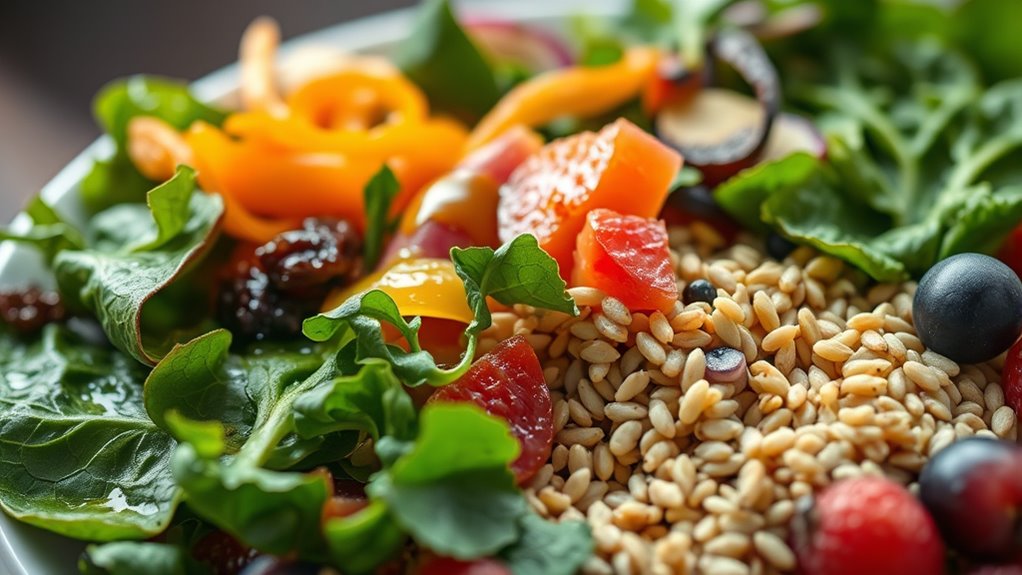
Your diet directly influences the composition of your gut microbiota, shaping which bacteria thrive. Eating fermented foods introduces beneficial microbes that can enhance your gut health. Making mindful dietary choices can, consequently, support a balanced gut ecosystem and overall well-being. Additionally, understanding the gut microbiota can help inform strategies to improve mental health through dietary interventions.
Gut Microbiota Composition
Ever wondered how the foods you eat influence the tiny organisms living in your gut? Your diet directly shapes your gut microbiota composition, affecting your overall health and mood. What you consume can increase beneficial bacteria or promote harmful ones. Here’s how your diet impacts your gut ecosystem:
- Fiber-rich foods encourage growth of good bacteria that produce mood-boosting compounds like serotonin.
- Processed foods and sugars can reduce diversity, allowing less helpful bacteria to thrive.
- Healthy fats and polyphenols support a balanced microbiota, promoting resilience and better communication with your brain.
- Incorporating a variety of materials available to suit personal preferences can further enhance microbiome diversity and stability.
Impact of Fermented Foods
Fermented foods have a powerful impact on your gut microbiota by introducing beneficial bacteria that help maintain a healthy ecosystem. When you eat foods like yogurt, kefir, sauerkraut, or kimchi, you boost the diversity and number of good microbes in your gut. These live microorganisms can improve digestion, enhance nutrient absorption, and strengthen your immune system. They also produce compounds that influence your gut-brain connection, potentially elevating mood and reducing stress. Incorporating fermented foods regularly can help restore balance if your microbiota is disrupted by antibiotics, poor diet, or stress. Personal development techniques such as mindfulness and self-reflection can further support your mental well-being as you work to improve your overall health. Over time, this can lead to improved mental clarity, emotional stability, and overall well-being. Remember, the quality and variety of fermented foods you choose directly impact their positive effects.
Nutrients That Support Brain and Gut Health
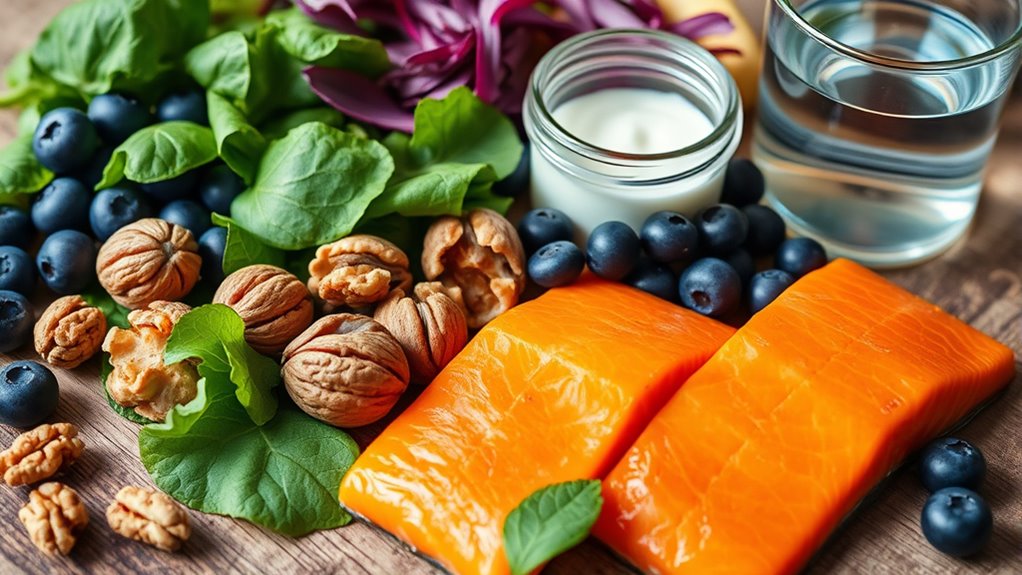
Certain nutrients play a essential role in maintaining both brain and gut health by supporting the growth of beneficial bacteria and ensuring proper neurotransmitter function. These nutrients fuel your gut microbiome and help your brain communicate effectively. Incorporating these nutrients into your diet can strengthen the gut–brain connection and boost your mood and cognition. Incorporates AI technologies are increasingly used to analyze the complex interactions within the gut-brain axis, leading to more personalized nutrition strategies.
Foods to Incorporate for a Balanced Microbiome
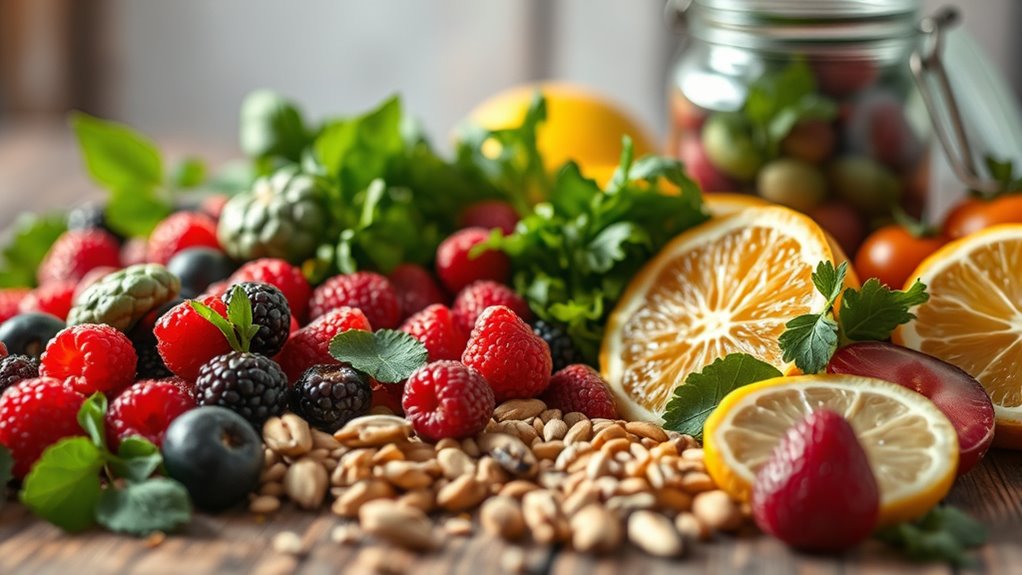
To support a healthy and balanced microbiome, you should include a variety of fiber-rich foods in your daily diet. Whole grains like oats, barley, and brown rice provide essential prebiotics that nourish beneficial bacteria. Incorporate plenty of fruits such as berries, apples, and pears, which contain natural fibers and antioxidants that promote gut diversity. Vegetables like broccoli, carrots, and leafy greens add fiber and phytochemicals to support microbial growth. Legumes, including lentils and chickpeas, are excellent sources of both fiber and protein, fostering a resilient microbiome. Fermented foods like yogurt, kefir, sauerkraut, and kimchi introduce live probiotics that directly enhance gut flora. By consistently including these foods, you help maintain microbial diversity and support overall gut health.
Dietary Patterns That Influence Mood
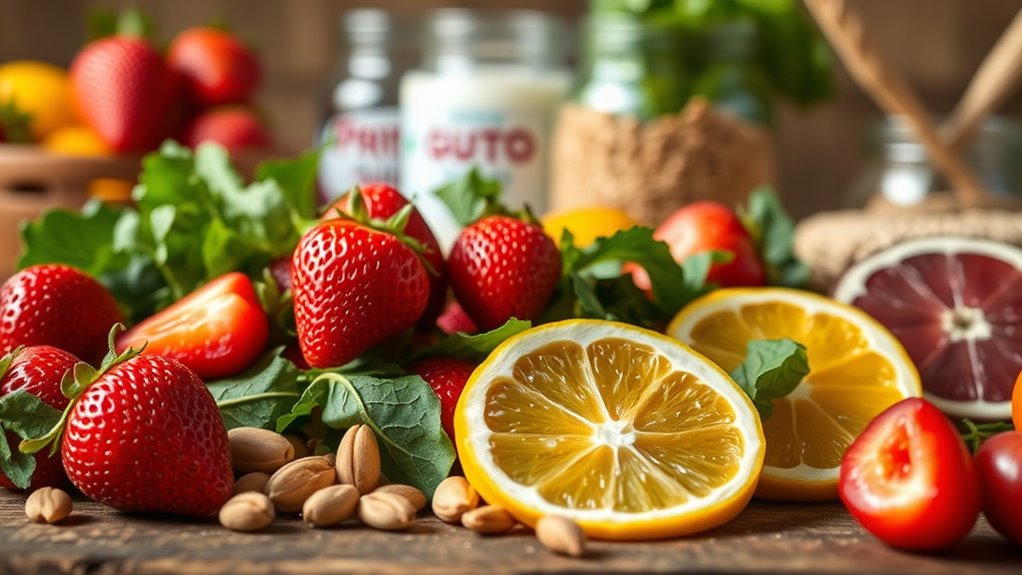
The foods you choose not only shape your gut microbiome but also influence your mood and mental well-being. Your dietary patterns can directly impact brain chemistry and emotional health. To boost your mood, consider these key patterns:
- Emphasize whole foods: Incorporate plenty of fruits, vegetables, and whole grains to support beneficial gut bacteria and produce mood-boosting neurotransmitters.
- Limit processed foods: Reduce intake of sugar and refined carbs, which can cause inflammation and mood swings.
- Include healthy fats: Consume omega-3-rich foods like fatty fish and nuts, known to promote brain health and emotional stability.
- Incorporate music therapy sessions: Engaging with calming music can help reduce stress and enhance emotional resilience, complementing your dietary efforts.
Adopting these patterns helps foster a balanced microbiome, positively affecting your mental well-being and resilience against mood disorders.
Practical Tips for Nurturing Your Gut–Brain Axis

Nurturing your gut–brain axis involves simple, consistent actions that support both your gut health and mental well-being. Start by including probiotic-rich foods like yogurt, kefir, and fermented vegetables in your daily meals. These help maintain a healthy balance of gut bacteria, which influences your mood. Next, focus on eating a diverse diet with plenty of fiber from fruits, vegetables, and whole grains; fiber fuels beneficial gut microbes. Reduce processed foods, excess sugar, and artificial additives, as they can disrupt your microbiome. Stay hydrated and manage stress through mindfulness or exercise, since stress impacts gut health. Prioritize sleep, as restorative rest strengthens your immune system and gut function. Small, mindful changes like these can profoundly improve your gut–brain connection over time.
Frequently Asked Questions
Can Specific Foods Instantly Improve Mood Through the Gut-Brain Axis?
You wonder if certain foods can instantly boost your mood. While some foods, like dark chocolate or probiotics, may provide quick feelings of happiness, their effects aren’t immediate or guaranteed. Your gut-brain axis influences mood over time as beneficial foods support gut health, which in turn impacts your emotions. So, eating mood-boosting foods can help, but for quick results, combining them with other relaxation techniques works best.
How Does Stress Impact Gut Microbiota and Mental Health?
Stress can markedly impact your gut microbiota, reducing beneficial bacteria and increasing harmful ones. This imbalance can lead to inflammation and disrupt your digestive health, which in turn affects your mental health. When you’re stressed, your body releases hormones that alter gut function and microbiota composition. As a result, you might experience mood swings, anxiety, or depression. Managing stress through relaxation techniques can help maintain a healthy gut and improve your mental well-being.
Are Probiotics Effective for Long-Term Mental Health Benefits?
Probiotics can offer long-term mental health benefits by supporting your gut microbiota, which influences your mood. When you regularly include probiotic-rich foods or supplements, you help maintain a healthy balance of gut bacteria, potentially reducing anxiety and depression over time. While results vary, consistent use can strengthen the gut–brain axis, leading to better mental resilience. Keep in mind, combining probiotics with a balanced diet amplifies these positive effects.
Does Age Influence the Gut-Brain Connection and Diet Needs?
Age definitely influences how your gut and brain connect, affecting your diet needs. As you get older, your gut microbiome changes, which can impact mood and mental health. You might need different foods or supplements to support your gut health. Paying attention to your body’s signals and adjusting your diet accordingly can help maintain a strong gut-brain connection, ultimately supporting your overall well-being at any age.
What Are Signs of an Unhealthy Gut Affecting Mental Well-Being?
When your gut isn’t healthy, you might notice signs like frequent bloating, irregular bowel movements, or stomach discomfort. Mental health can also suffer, leading to feelings of anxiety, depression, or brain fog. You may feel more stressed or have trouble concentrating. These symptoms indicate that your gut’s imbalance could be impacting your mood and overall mental well-being, so paying attention and making dietary changes can help restore balance.
Conclusion
By prioritizing a balanced diet rich in fiber, fermented foods, and whole grains, you can support your gut–brain axis and boost your mood. Did you know that people with diverse gut microbiomes are 40% less likely to experience depression? Taking small steps to nurture your gut health isn’t just good for digestion — it can truly improve your mental well-being. Start today, and feel the positive impact on your mood and overall health.









